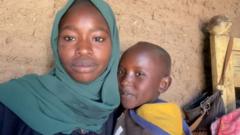Despite calls for mass demonstrations, widespread fear results in empty streets and shuttered businesses across Zimbabwe.
Zimbabwe Declares Shutdown Amid Protest Calls for President's Resignation

Zimbabwe Declares Shutdown Amid Protest Calls for President's Resignation
Nationwide closure occurs as citizens resist participating in anti-government protests under heavy police presence.
In a dramatic turn of events, Zimbabweans opted for a national shutdown instead of participating in protests aimed at ousting President Emmerson Mnangagwa. A heavy police presence on the streets led to minimal engagement from protestors, with only a small group marching through the capital. The protests were spearheaded by disillusioned war veterans, who accuse Mnangagwa of corruption and attempt to cling to power. As police dispersed the handful of protestors, protest leader Blessed Geza took to social media, urging citizens not to be "cowards."
Emmerson Mnangagwa, who took office in 2017 after a coup that deposed long-time leader Robert Mugabe, is nearing the end of his second term and is under scrutiny for rumored plans to extend his presidency to 2030. The protest leader, Geza, has publicly supported Vice-President Constantine Chiwenga as a preferable alternative, but Chiwenga has chosen to remain silent on the mounting calls for his ascension to power.
On Monday, while few protest activities occurred, social media was alive with updates. Videos from the protest showed police employing tear gas on demonstrators, capturing the tense atmosphere. One elderly woman, reliant on crutches, expressed her struggles, stating, "I am taking care of my grandchildren because my children cannot afford to," highlighting the everyday challenges faced by many Zimbabweans.
In reaction to the limited participation, Zanu-PF official Farai Murapira dismissed social media narratives, but political analysts like Ibbo Mandaza countered that the shutdown served as a significant political statement. Throughout various cities, businesses were largely closed, schools shut down, and public transport was minimal, as residents steered clear of potential clashes. Police increased security throughout Harare with roadblocks and heavy patrols.
Amid heightened tension, Zimbabwe's religious leaders have called for calm, warning of the perilous potential for civil unrest in the already fragile state. A petrol station attendant noted, “ordinary people didn't want the country to slide into civil war.” Central to this unease is the speculation that Mnangagwa may attempt to extend his term beyond the constitutional limit of two terms. Despite assurances from the president regarding his future intentions, skepticism looms large, alongside rising anger from Geza and other disgruntled citizens.
As Zimbabwe continues to navigate these turbulent waters, the tension between government authority and public dissent remains palpable, and the future political landscape appears uncertain.
Emmerson Mnangagwa, who took office in 2017 after a coup that deposed long-time leader Robert Mugabe, is nearing the end of his second term and is under scrutiny for rumored plans to extend his presidency to 2030. The protest leader, Geza, has publicly supported Vice-President Constantine Chiwenga as a preferable alternative, but Chiwenga has chosen to remain silent on the mounting calls for his ascension to power.
On Monday, while few protest activities occurred, social media was alive with updates. Videos from the protest showed police employing tear gas on demonstrators, capturing the tense atmosphere. One elderly woman, reliant on crutches, expressed her struggles, stating, "I am taking care of my grandchildren because my children cannot afford to," highlighting the everyday challenges faced by many Zimbabweans.
In reaction to the limited participation, Zanu-PF official Farai Murapira dismissed social media narratives, but political analysts like Ibbo Mandaza countered that the shutdown served as a significant political statement. Throughout various cities, businesses were largely closed, schools shut down, and public transport was minimal, as residents steered clear of potential clashes. Police increased security throughout Harare with roadblocks and heavy patrols.
Amid heightened tension, Zimbabwe's religious leaders have called for calm, warning of the perilous potential for civil unrest in the already fragile state. A petrol station attendant noted, “ordinary people didn't want the country to slide into civil war.” Central to this unease is the speculation that Mnangagwa may attempt to extend his term beyond the constitutional limit of two terms. Despite assurances from the president regarding his future intentions, skepticism looms large, alongside rising anger from Geza and other disgruntled citizens.
As Zimbabwe continues to navigate these turbulent waters, the tension between government authority and public dissent remains palpable, and the future political landscape appears uncertain.



















